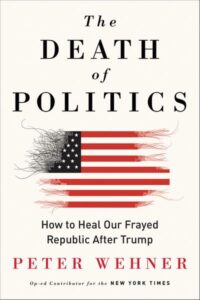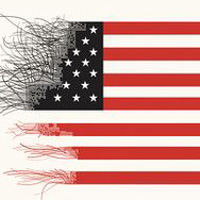 This review of The Death Of Politics: How to Heal Our Frayed Republic After Trump (New York: HarperOne, 2019), is in the form of a letter sent to the author, Peter Wehner.
This review of The Death Of Politics: How to Heal Our Frayed Republic After Trump (New York: HarperOne, 2019), is in the form of a letter sent to the author, Peter Wehner.
Dear Peter Wehner:
You, Republican, ethicist and speech-writer for Reagan and Bush, have written a scathing critique of Donald J. Trump. In this age of extreme partisan polarization, this is a rare thing. In suggesting that Trump’s presidency could be a catastrophe signaling the death of the best of the American political tradition covering the roles of morality, religion, rhetoric, debate, and citizenship, you trigger an alarm that many Americans have felt during Trump’s run for office,
and during the two and a half years he has been in office.
With the telling of over 10,000 documented lies, where his feelings and beliefs have become “facts”, where truth is not truth, Trump is not only supporting ignorance and the devaluation of truth; he is promoting it. This is dangerous to society and damaging to government.
Further, since your book was published, Trump’s past and present racist and white supremacist rhetoric regarding immigrants and duly elected legislators of color has become current news
and appears to be defining his re-election campaign… with no meaningful dissent from your
Republican cohorts.
Trump has described others as “nut job,” “crazy,” “maniac,” words that could well be used to
describe himself. He has been called a “huckster” and “con man” and his past and current
behavior, as businessman, reality show star, and political figure seems to fit these terms. This
would be shocking when applied to anyone in political office, but to describe – define – the
President of the United States, underscores the crisis in our political system that you explore in
your book, The Death Of Politics.
I agree with you that we must return to the true meaning and practice of politics as noted by
Aristotle: managing “the affairs of the city,” with civility above all, and the concern of human
flourishing based on the equality of each person.
I also agree that politics in America has been corrupted, or co-opted, by the faith-based
movement in the Republican Party despite the guarantee of separation of church and state,
supported by James Madison and the Bill of Rights. Your concern regarding evangelical
Christianity becoming a vehicle of middle-class white resentment (of social displacement – loss
of status – rather than economic conditions) leading to the disregard of Trump’s immensely
flawed character in favor of conservative policy wins, suggests to me how easily souls can be
sold if the propaganda is right.
How did we arrive at this point in our history? You consider the causes as massive
demographic and cultural change; long-term income stagnation (except for the wealthy);
solutions to political-social problems languishing in partisanship; and the severe loss of trust in
the political class. Democrats appear to be more comfortable with some social changes than
Republicans: the reduction of two-parent households, two working parents in a household, gay
marriage, as examples. These current societal shifts are comparable to the huge changes
brought by the Industrial Revolution. Government is not helping society manage itself
efficiently, if at all, during these times.
I appreciate the way in which you addressed the importance of Aristotle, John Locke, and
Abraham Lincoln in shaping American politics, through education, ethics, contemplation, the
pursuit of virtue and happiness (Aristotle); to “regulate assent and moderate our
persuasions,” (Locke); and the belief that basic human rights could not be voted up or down,
but that all men are created equal (Lincoln).
You did not specifically say it, but these elements have led our Democracy to accomplish
magnificent things for its people, including: regulatory actions against out of control trusts, aid
to farmers, and the creation of the Federal Reserve Bank (Wilson); social security, the United
Nations, the GI Bill Of Rights, the rural electrification of America (Roosevelt); federal housing
loans, the Fulbright scholarship program, the Rural Telephone Act, the establishment of NATO
(Truman); the Peace Corps and VISTA programs (Kennedy); civil rights and voting rights
protections, the Head Start and Medicare/Medicaid programs (Johnson); the establishment of
Federal emergency management, the departments of Education and Energy (Carter); the
Family and Medical Leave Act, the Earned Income Tax Credit, and the National Voter
Registration Act (Clinton); the Affordable Care Act, fair pay legislation and veteran’s health care
legislation (Obama) – all under Democrat presidents.
Further, beginning with Lincoln, the Emancipation Proclamation; the right to vote for women
(Grant); protections for wildlife, forests and antiquities (Theodore Roosevelt); the interstate
highway system (Eisenhower); anti-discrimination laws against women, the EPA, OSHA, the
Clean Air Act (Nixon); the Americans with Disabilities Act (H.W. Bush); and Medicare Pt. D (G.W.
Bush) – under Republican presidents (although current Republicans would likely not approve
of many of these today, and have actively tried to dismantle the effectiveness of several laws,
including the right to vote).
You point to several large and looming issues yet to be effectively addressed, and likely to be
ignored by the Trump administration, among them being exorbitant costs of college, the opioid
epidemic, mass killings and gun control – and the issue which seems to override all of these,
global warming and climate chaos, which is affecting every person in every area of our planet.
You allude to what you view as positive manifestations of our government’s recent actions: the
recent tax law changes and the deregulation of many Obama-era laws. I disagree with this: the
recent tax changes have vastly benefited the rich at the expense of the working classes and
the poor, and deregulation of business and corporate interests, also benefiting the wealthy,
means more pollution and increased environmental degradation.
How can citizens reclaim a working political system? You aver, “Citizens need to renew their
commitment to truth itself and be willing to fight for it and to fight falsity.” This can be
challenging in an age of exploded social/news media outlets. Disputes over facts must not be
misconstrued as disputes over principles as some media outlets and conservative
commentators do.
You explored moderation, compromise, and civility as ways we can re-focus ourselves to a
more workable politics. As you noted, the task of politics is to live peaceably with differences
and to find appropriate outlets of views to be heard and represented. Trump’s name-calling and
fear-mongering does not accomplish this; it subverts the process of politics.
Congress must re-assume its role in the restoration of politics. It must bargain, or compromise,
to pass legislation; it must authorize and appropriate funds to support legislation; it must allow
longer floor time to present and discuss legislation to get a vote; and it must play a greater role
in oversight of executive and regulatory agencies. Presently, it is either not performing these
functions, or not being very effective at them. Wouldn’t it be a significant step if Congress
could try to achieve consensus on some salient issues as a way to reduce the current “us
versus them” mindset? Perhaps, consensus is too much to ask of our dysfunctional
government.
However, there are things that every citizen can do. We can support people who model what
respectful disagreements (and agreements) look like; oppose those who are not good models
of civil behavior; support the end of disinformation campaigns by this society and other
governments; regulate and hold social medial platforms accountable for their actions; learn
American history to help improve our civic knowledge and democratic focus. In addition, you
suggest leadership training for youth, national service, and civility training programs which
teach good ways to disagree, as well as listening skills.
In 2016, the American people elected (selected through the Electoral College?) a person
manifestly unequipped intellectually, temperamentally, psychologically, and through his life
experience of indebtedness and bankruptcies and racially biased behavior, to govern. He is
creating – and entertaining – a tribe of followers as his base with a rhetoric of hate, derision
and division, with a staff and most political members of the Republican Party which adulates
and cannot question his behavior without fear of reprisal. This has led us to a crisis of
confidence.
Your book represents the hope and promise that we are equipped, through our democratic
process, to do something about. This should be a must-read for every politician in America.
Thank you.
Frank E Grant
FEG 081419










